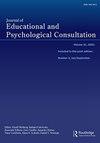学校心理学家作为学前顾问:扩大基于课堂的项目范围内的积极行为支持
IF 1.1
4区 心理学
Q4 PSYCHOLOGY, EDUCATIONAL
Journal of Educational and Psychological Consultation
Pub Date : 2021-08-08
DOI:10.1080/10474412.2021.1959338
引用次数: 0
摘要
摘要实施支持幼儿园工作人员行为的多层框架需要与熟练的专业人员合作。鉴于他们的培训和技能,学校心理学家有独特的能力胜任这一角色;然而,有限的现有研究指导从业者最大限度地发挥他们作为幼儿园系统级顾问的潜力,特别是通过应用系统级行为咨询(BC)。本文详细描述了两位学校心理学家如何应用系统级BC来满足一所幼儿园的需求,从而实施课堂辅导干预。辅导侧重于员工在课堂上使用金字塔模型实践,包括10间教室的系统观察和绩效反馈。有三项技能需要改进:教学期望、表扬和教学社交技能。多基线设计显示,工作人员的技能实施有所提高,被咨询人发现系统级别的BC是可以接受的。讨论了学校心理学家作为幼儿园顾问的作用。本文章由计算机程序翻译,如有差异,请以英文原文为准。
School Psychologists as Preschool Consultants: Scaling up Classroom-Based Program-Wide Positive Behavior Supports
ABSTRACT Implementation of multi-tiered frameworks for supporting staff behavior in preschools requires collaboration with skilled professionals. Given their training and skillset, school psychologists are uniquely equipped to fill this role; however, limited existing research guides practitioners in maximizing their potential as systems-level consultants in preschools, specifically through the application of systems-level behavioral consultation (BC). This paper provides a detailed description of how two school psychologists applied systems-level BC to address the needs of one preschool, resulting in the implementation of a classroom coaching intervention. Coaching, which focused on staff’s use of Pyramid Model practices in the classroom, consisted of systematic observations and performance feedback across 10 classrooms. Three skills were targeted for improvement: Teaching Expectations, Praise, and Teaching Social Skills. A multiple baseline design showed increases in staff’s skill implementation, and consultees found systems-level BC acceptable. Implications for school psychologists’ role as consultants in preschools are discussed.
求助全文
通过发布文献求助,成功后即可免费获取论文全文。
去求助
来源期刊

Journal of Educational and Psychological Consultation
PSYCHOLOGY, EDUCATIONAL-
CiteScore
3.40
自引率
23.50%
发文量
20
期刊介绍:
The Journal of Educational & Psychological Consultation (JEPC) provides a forum for improving the scientific understanding of consultation and for describing practical strategies to increase the effectiveness and efficiency of consultation services. Consultation is broadly defined as a process that facilitates problem solving for individuals, groups, and organizations. JEPC publishes articles and special thematic issues that describe formal research, evaluate practice, examine the program implementation process, review relevant literature, investigate systems change, discuss salient issues, and carefully document the translation of theory into practice.
 求助内容:
求助内容: 应助结果提醒方式:
应助结果提醒方式:


